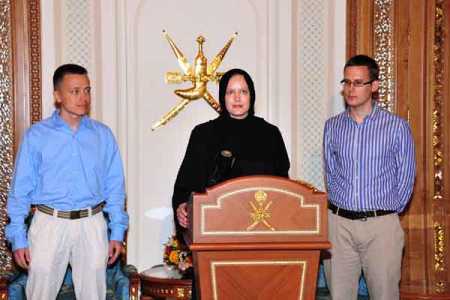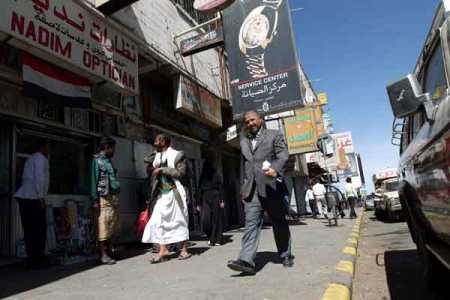Fri, 10 May, 2013 12:07:35 AM Helsinki dubs Yemen perilous travel destination Controversy on over ransom payment FTimes Report, May 10
 Finnish couple and their Austrian friend abducted in Yemen by Al-Qaeda militants stand at the airport of the Omani capital Muscat on Thursday after they were handed over to Omani authorities. The three Europeans, seized in Sanaa on December 21, were freed by local tribesmen on the border with Oman overnight, an Yemeni official said. Photo AFP / Lehtikuva Finnish couple Leila and Atte Kaleva and their Austrian friend Dominik Neubauer were released on Wednesday night in the Yemen-Oman border area four and a half months into their abduction al-Qaeda fighters from Sana'a, the capital city of Yemen, on December 21.
The three abducted Europeans were handed over to the Oman authorities by a tribe at Hawf village, said Yemeni media reports and Finnish government sources.
The hostages were set free after the authorities of the neighbouring Oman had held negotiations with the abductors and paid them ransom for the release, a senior Yemini security official told Reuters, reported STT.
Foreign Minister Erkki Tuomioja, however, rejected outright the report of paying ransom to the abductors, said another STT report.
‘Finland did not pay any ransom to the abductors as financing terrorists is clearly forbidden under the international rules,’ Tuomioja told a press conference late Thursday night.
He said the Finnish couple had reached Austria, where they were undergoing medical checkups at the moment, and would return home within the shortest possible time.

Photo Photo AFP / Lehtikuva Earlier in the night, a foreign office press release said the abducted were released safely in good physical condition and their release was a positive outcome of close cooperation between Finland and Austria.
The prolonged deprivation of liberty, however, is a traumatic experience for both the abducted and their loved ones. Their families expressed the hope that the press would continue to respect their privacy as they had done during their captivity and would allow them to recover in peace, the release said.
Helsinki thanked Vienna, Muscat, Sanaa, and all other international actors concerned for their cooperation in resolving the crisis.
The president, prime minister, and foreign minister of Finland had maintained an excellent and close cooperation throughout the period since the December 21 abduction to resolve the issue, the release said.
Meanwhile, Helsinki has dubbed Yemen a highly dangerous travel destination, saying the risk of being abducted there is very real and not all such cases end as well as this case has, and advised the Finnish people to avoid travelling to Yemen. The government also urged the Finns still living in Yemen to leave it immediately.
The three abducted Europeans were handed over by a tribe in Hawf village on the Yemen-Oman border to Omani authorities, reported the Yemen Times, an English-language daily published from Yemen.
At the time of release, the three were being held by alleged al-Qaeda affiliates, but it is no clear whether the hostages were originally abducted by al-Qaeda or the Europeans were sold to them by a local tribe.

Yemenis walk past the shop outside of Which three foreigners were kidnapped in Sanaa in December last year.Photo AFP / Lehtikuva Qatar had initially been negotiating with the abductors to get the hostages released, just as it played a role in the release of a Swiss woman who had been held by al-Qaeda affiliates for over a year. However, it appears that the kidnappers were dissatisfied with the amount of ransom offered to them and that round of negotiations fell through, said the Yemen Times report.
It is believed the foreigners and their abductors have been on the move for the last five months, hosted for days at a time by area tribes, the report said. According to official sources, initially, they were taken to the outskirts of the capital, before moving to the Hareeb area in Marib governorate.
They were later taken to Al-Shihr in Hadramout governorate and finally to Hawf in Al-Mahra governorate near the Omani border.
The Hawf tribe, which is split between Yemen and Oman, is believed to have turned against the al-Qaeda militants being pressured by the Omani government. The alleged kidnappers have been arrested by the tribe and handed over to the Yemeni authorities.
President Sauli Niinistö and Prime Minister Jyrki Katainen expressed their satisfaction at the release of the abducted.
Earlier on April 27, a Yemeni journalist claimed he had seen masked gunmen abducting the Finnish couple along with an Austrian student from a camera shop in Sana'a.
The Yemen Post Editor Hakim Almasmari told Yle that a reporter of the newspaper had seen the Finnish couple that week. Almasmari also said negotiations for release of the abducted would be held with tribal leaders acting as mediators.
The abductors on February 22 released on Youtube a video containing a demand for ransom to release the Austrian national.
Earlier, the Finnish authorities had taken several initiatives and maintained communication with the Yemeni government and urged for taking the necessary measures to rescue the couple.
Foreign Minister Tuomioja on March 31 visited Yemen and held meetings with government high-ups, including the president, on developments in the Finnish couple abduction case.
The authorities said the three were later sold to al-Qaeda members and transferred to the small town of al-Manaseh in the south of the capital.
Earlier, the tribal leaders in the southern suburbs of Sana'a told the Yemen Post the release of the three foreigners would take place anytime between a week and two months, depending on when the two sides agreed on the ransom amount.
‘At times it does not only involve money, it also involves release of prisoners and this case seems like both money and prisoners will be needed to ensure the release of the foreigners,’ a tribal leader told the Yemen Post.
Tribesmen usually kidnap foreigners to pressure the authorities into meeting their demands, including ransom, releasing detainees, or providing some services in their areas.
Several kidnappings have been reported this year amid alarming security disorder deepened by power outage as well as the unrest that began last year.
More News
|
|
Finland Times
| Friday, 11 July, 2025 |

